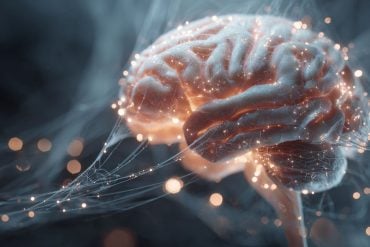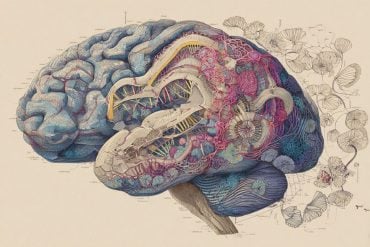Summary: Consuming a high fat diet during adolescence could contribute to cognitive impairment as an adult, a new study reports.
Source: ETH Zurich.
Junk food is a burgeoning problem for modern society: we literally have too much on our plate. Fatty and unhealthy foods are especially popular with young children and adolescents. They are often the cheapest and most convenient eating option. Unfortunately, junk food can potentially damage the immature brain when consumed over an extended period as the young brain matures. High consumption of fatty foods during adolescence may in fact impair cognitive functions in adulthood, according to a recent study conducted by researchers from ETH Zurich and the University of Zurich, which has just been published in the medical journal Molecular Psychiatry.
The scientists arrived at this worrying conclusion after performing a study comparing the impact on the brains of juvenile and adult mice on being fed either an extremely high-fat diet or normal food. The fat-rich diet contained excessively high levels of saturated fats — the type most commonly found in fast foods, charcuterie products, butter and coconut oil.
Behavioural problems after only a few weeks
After a period of just four weeks, the researchers detected the first signs of impairment in the cognitive functions of young mice fed on a high-fat diet. These problems materialised even before the mice actually started to show any weight gain. One of the key factors in the development of these cognitive problems is a person’s age when the fatty foods are consumed: they tend to have a particularly negative impact on the maturation of the prefrontal cortex in the period from late childhood to early adulthood.
The prefrontal cortex is particularly vulnerable, as it takes longer to mature than other structures in the mammalian brain. In both mice and humans, this area of the brain is not fully developed until early adulthood. As it matures, the prefrontal cortex is therefore vulnerable to negative environmental experiences such as stress, infections and trauma, or even — as the study suggests — a poorly balanced diet.
The prefrontal cortex is responsible for the executive functions of the human brain: it looks after memory, planning, attention, impulse control and social behaviour. If this area of the brain is not functioning correctly, perhaps as the result of an accident or brain tumour, it can lead to cognitive deficits and personality changes. A person may have difficulty with complex learning processes, lose their inhibitions, or become aggressive, childish or compulsive.
No comparable effect on the adult brain
By contrast, the researchers failed to identify comparable changes in the behaviour of mature mice that had been fed a high-fat diet over an extended period. Obviously their metabolic systems were severely disrupted and they became obese. “Even so, this does not rule out the possibility that a high-fat diet may also be harmful for the brains of adult mice,” stresses Urs Meyer, former Group Leader of the Laboratory for Physiology and Behaviour at ETH Zurich and now professor at the University of Zurich.
Similarities between the mouse and human brain
According to Professor Meyer, the results of the mice study are readily translatable to humans: “As in humans, the prefrontal cortex in mice matures mainly during adolescence.” The executive functions attributed to this area of the brain are also similar for both mice and humans. The neuronal structures that are affected by fatty foods are also identical in both organisms.

The professor points out, however, that the very fatty diet – mice received over 60 percent of their calories in the form of fats — was not typical of the amount consumed by most people over an extended period. Such an exaggerated level of fat was deliberately chosen in order to be able to clearly demonstrate the effect of fatty foods on the maturation of the brain and to provide evidence for the underlying principle. “Only very few children and adolescents consume high-fat diets so excessively,” says Professor Meyer.
Nor is the study able to give any indication of the maximum amount of fat that a diet should contain so as to avoid subsequent damage to the maturing prefrontal cortex. This did not fall within the scope of the study. “Anyone eating fast food once a week is unlikely to be at risk.”
Nevertheless, Professor Meyer thinks that much more attention needs to be paid to nutrition as a child is growing up. “During adolescence, children and young adults should have a well-balanced diet based on nutritious foods.”
Funding: This study was funded by the Swiss National Science Foundation, European Union Seventh Framework Program, Inserm, ETH Zurich, Mineco.
Source: Urs Meyer – ETH Zurich
Image Source: NeuroscienceNews.com image is in the public domain.
Original Research: Abstract for “Hypervulnerability of the adolescent prefrontal cortex to nutritional stress via reelin deficiency” by M A Labouesse, O Lassalle, J Richetto, J Iafrati, U Weber-Stadlbauer, T Notter, T Gschwind, L Pujadas, E Soriano, A C Reichelt, C Labouesse, W Langhans, P Chavis and U Meyer in Molecular Psychiatry. Published online November 157 2016 doi:10.1038/mp.2016.193
[cbtabs][cbtab title=”MLA”]ETH Zurich. “High Fat Diet Disrupts Brain Maturation.” NeuroscienceNews. NeuroscienceNews, 15 November 2016.
<https://neurosciencenews.com/diet-brain-maturation-5522/>.[/cbtab][cbtab title=”APA”]ETH Zurich. (2016, November 15). High Fat Diet Disrupts Brain Maturation. NeuroscienceNews. Retrieved November 15, 2016 from https://neurosciencenews.com/diet-brain-maturation-5522/[/cbtab][cbtab title=”Chicago”]ETH Zurich. “High Fat Diet Disrupts Brain Maturation.” https://neurosciencenews.com/diet-brain-maturation-5522/ (accessed November 15, 2016).[/cbtab][/cbtabs]
Abstract
Hypervulnerability of the adolescent prefrontal cortex to nutritional stress via reelin deficiency
Overconsumption of high-fat diets (HFDs) can critically affect synaptic and cognitive functions within telencephalic structures such as the medial prefrontal cortex (mPFC). The underlying mechanisms, however, remain largely unknown. Here we show that adolescence is a sensitive period for the emergence of prefrontal cognitive deficits in response to HFD. We establish that the synaptic modulator reelin (RELN) is a critical mediator of this vulnerability because (1) periadolescent HFD (pHFD) selectively downregulates prefrontal RELN+ cells and (2) augmenting mPFC RELN levels using transgenesis or prefrontal pharmacology prevents the pHFD-induced prefrontal cognitive deficits. We further identify N-methyl-d-aspartate-dependent long-term depression (NMDA-LTD) at prefrontal excitatory synapses as a synaptic signature of this association because pHFD abolishes NMDA-LTD, a function that is restored by RELN overexpression. We believe this study provides the first mechanistic insight into the vulnerability of the adolescent mPFC towards nutritional stress, such as HFDs. Our findings have primary relevance to obese individuals who are at an increased risk of developing neurological cognitive comorbidities, and may extend to multiple neuropsychiatric and neurological disorders in which RELN deficiency is a common feature.
“Hypervulnerability of the adolescent prefrontal cortex to nutritional stress via reelin deficiency” by M A Labouesse, O Lassalle, J Richetto, J Iafrati, U Weber-Stadlbauer, T Notter, T Gschwind, L Pujadas, E Soriano, A C Reichelt, C Labouesse, W Langhans, P Chavis and U Meyer in Molecular Psychiatry. Published online November 157 2016 doi:10.1038/mp.2016.193






